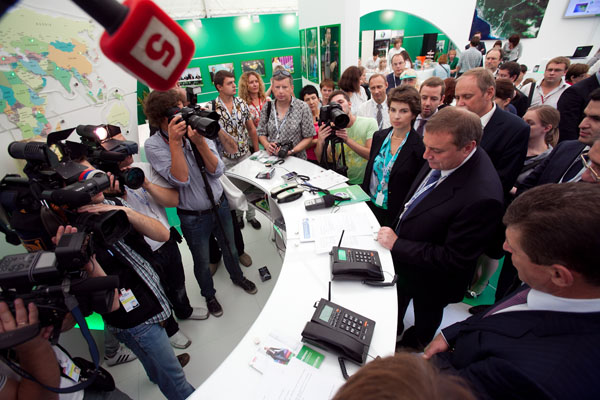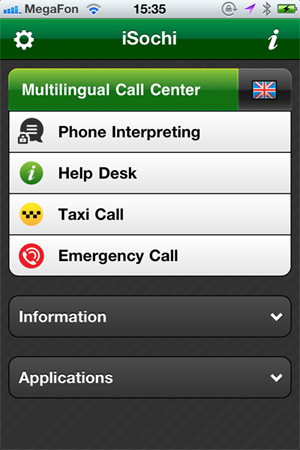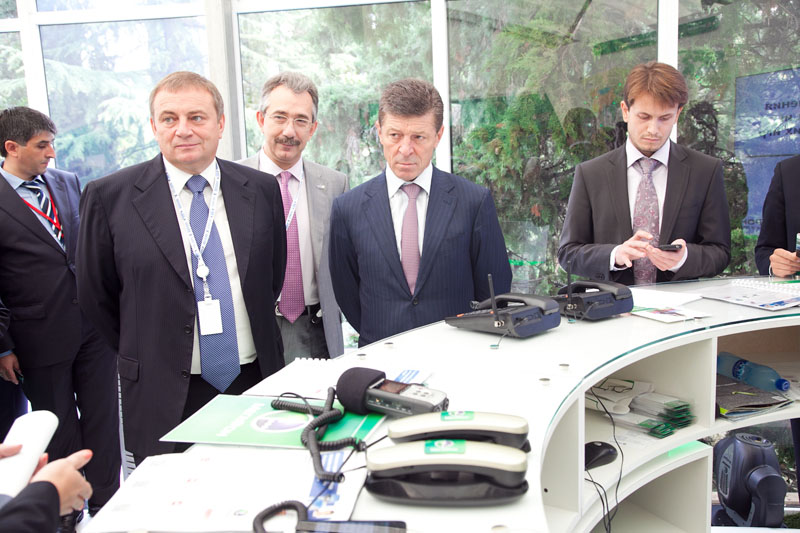Olympics 2014: how to help a foreigner to cope with the Russian language

On September 17, in Sochi, together with MegaFon, we presented a linguistic program for the future Olympiad. The ultimate goal of this program is to make foreign guests of the 2014 Olympiad feel comfortable in the city and so that they can speak freely in all situations, no matter what language is their native language. Until recently, such a project might have seemed absolutely impracticable - after all, you would not put a personal translator on each of the hundreds of thousands of foreigners. But today this task, which previously could not be solved even with huge material investments, can be successfully solved with the help of modern technologies. Under the cut, we will talk about what we came up with for the Olympics, with technical details for fans.
So, the main task is to provide comfortable communications for foreign guests at the Olympics. Traditional ways:
- translate in the city all signs, signs and menus,
- to issue localized maps and guides,
- to collect all potentially useful reference information (timetables, transport routes, addresses and telephone numbers of institutions, institutions and services) into a single database and translate it into the main languages,
- organize the work of translators in service centers and at major events.
')
All this will be in Sochi.

However, it is obvious that these measures do not allow to completely eliminate language barriers. A foreigner at the Olympics will have to communicate with people, for example, with a taxi driver, doctor, police officer, just with a man on the street. Finally, in many situations where it is necessary to quickly obtain information, it is more convenient to call the help desk and ask what to look for in maps or guidebooks.
To help guests of the Olympiad in such situations, together with MegaFon we are launching a multilingual call center that will support 8-10 languages (English, German, French, Italian, Spanish, Chinese, Korean, Japanese, Arabic, Russian ). With its help, foreign guests will be able to in their native or understandable language:
- obtain any background information on urban institutions, tourist and other objects;
- order goods or services, for example: book a hotel room or plane tickets, call a taxi, order dinner or medicine delivery, etc .;
- promptly contact the ambulance service, police, Emergencies Ministry and other emergency services;
- easy to navigate in the city, having received the necessary information about the timetable or routes of public transport;
- and, of course, by calling the call-center, a foreign tourist will be able to use the services of an interpreter online in any situations when it is needed.
The ASTJ IP telephony platform was used for the work of remote translation operators when building a call-center. This is a specialized platform of ABBYY Language Services, created to provide the service "translator by phone" in on-demand mode (we wrote about it here ). The platform allows for dynamic IVR applications and flexible call routing. The application for the translation service identifies the subscriber and, based on the data from his profile and the parameters entered by him, constructs a call processing and distribution script for the translator.
ASTJ platform provides the ability to quickly deploy and scale, it implements the ability to work in the "multisite" mode - when several phone servers are working in an integrated group, sharing a common pool of agents and queues. Each of the servers included in the cluster can be virtual, and in fact we use just such a configuration, since it is more reliable and maintainable. Servers running CentOS.
The exact load that will have on the call-center during the Olympics is unknown, which means that it will be necessary to ensure technologically and organizationally the ability to greatly increase the number of operators and calls processed. The call center architecture allows you to vary the resources of translators several times within two weeks. According to various estimates, the required number of operators with knowledge of foreign languages (without division into languages) varies from 30-50 (at night and during the daytime) to 1500-2000 (during the opening and closing of the Games).
 Another component of the program is the ABBYY iSochi mobile app for iOS and Android platforms, which will help Sochi guests to navigate in the city on their own. The application provides convenient access to the call-center and allows you to quickly connect a professional translator to any conversation. Also ABBYY iSochi contains useful background information for successful orientation in the city.
Another component of the program is the ABBYY iSochi mobile app for iOS and Android platforms, which will help Sochi guests to navigate in the city on their own. The application provides convenient access to the call-center and allows you to quickly connect a professional translator to any conversation. Also ABBYY iSochi contains useful background information for successful orientation in the city.One of the interesting features of the application is the automatic detection of the user's language based on the phone language settings (with the ability to change the language manually). During each call, the program automatically sends this information to the call center, and the user is answered in a language understandable to him. The application allows you to select the type of call (call the call-center to get help information, emergency call, taxi call or transfer by phone) and determines the coordinates of the caller (if there is a GPS receiver in the smartphone running the application). As a result, a user from Japan can simply click on the “Taxi” button, and he will immediately get to the call center operator who speaks Japanese, knows that the call is made with the goal of ordering a taxi, and also sees the location on the map the caller.
Directly from the iSochi shell you can install other ABBYY mobile programs that make life easier in a foreign country - ABBYY Lingvo , ABBYY TextGrabber , ABBYY Business Card Reader .
Technical details for amateurs
The application transmits data (language, type of calls, coordinates and authorization parameters) by sending a POST request via HTTP to a web server. The web server (Nginx + Perl (Mojolicious + Starman) + MySQL) processes the received parameters, identifies the user in the system, stores the data in the database and gives the application a response, after which the application initiates a call to the call center. In the tests performed, processing the request on the server side took no more than 30–40 ms. In addition, there are several other scenarios in which the application accesses the web server (for example, requesting a balance to access paid services or changing personal data), the responses are returned as JSON structures.
The web component of the solution is scalable due to the fact that the Nginx frontend can be configured to distribute incoming requests over an arbitrary number of backends, each backend is a real or virtual machine under FreeBSD, on which prefork daemons are running ( Starman is used as the loader, the framework is Mojolicious ) with constantly open connections to the database (used by DBIx :: Connector ). You can run up to (N - 1) daemon per server, where N is the number of available physical and logical cores. The number of virtualok can grow quite quickly.
The call center, upon receiving an incoming call, requests the presence of information on the subscriber in the database. If he finds information received from the application, then the call is further processed on the basis of these parameters — the system selects the most suitable operator / translator and establishes the connection. Calls with the “emergency call” type are given priority.
In the future, it is planned to use binary replication to maintain the required number of database replicas containing relatively slowly changing information, so that the cluster of call-center servers will access "their" replicas, removing the overwhelming part of the load from the master database.
In a scheme with several clusters, the incoming call via SIP protocol is distributed to one of the clusters (for the time being it is simply uniform), the number of clusters can be quite arbitrary, provided that they are provided with a sufficient number of database replicas.
Information processing takes 30-40 milliseconds on the web server side, plus up to 100 milliseconds for passing packets and a few milliseconds on the call center side. This allows the use of such a scheme in real-time telephony.
All the main components of the Sochi Olympics linguistic program - a multilingual reference database, a call-center and the iSochi application - are tightly integrated. As a result, for the Olympics, we will launch a unique service that has not yet had analogues in the world. We hope that this service will make Sochi truly comfortable for the stay of foreign guests.
And in conclusion, we say that this entire project does not require additional funding from the state, since all innovative solutions are implemented at the expense of partners (ABBYY and MegaFon).

Sochi Mayor Anatoly Pakhomov and Deputy Prime Minister Dmitry Kozak at a presentation on the linguistic program for the Olympics
Yegor Zaikin,
ABBYY Language Services
Source: https://habr.com/ru/post/129144/
All Articles